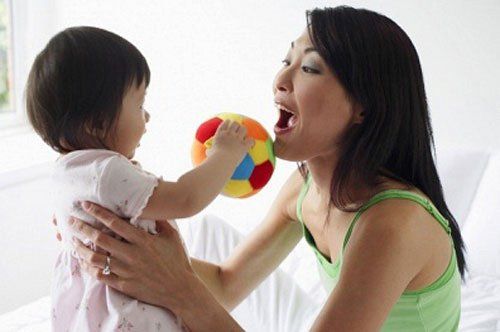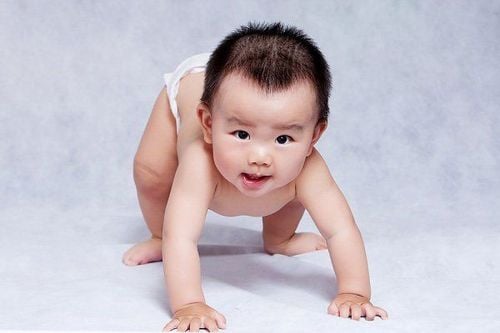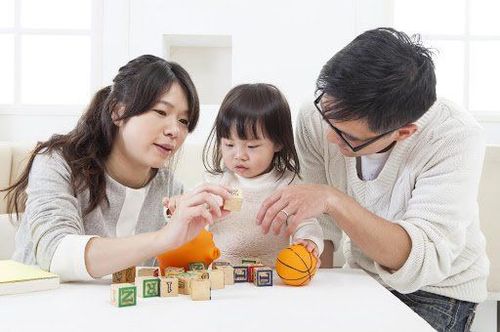This is an automatically translated article.
When your baby is 19 months old you may notice that his growth rate has slowed down a bit since his first year of life. Toddlers develop at a much slower rate than infants. Although it may seem a little different on the surface, your child is making daily strides in language development, learning, and cognitive development. Doctors use milestones to tell if your toddler is developing as expected. There are many things that are considered normal, so some children may acquire skills earlier or later than others. In this article, we will provide useful information for parents to understand about the language and cognitive development of their 19-month-old baby.
1. Language characteristics of children at the 19th month
19-month-old babies can already recognize verbs. A typical 19-month-old baby's vocabulary may consist of 10 to 30 words or as many as 50 words. Babies who reach 19 months old are already able to link two or more words together and start using more "action" words. Verbs like "go", "run" and "jump" have become very common among children in this age group, and at the same time, associating a verb with the child's name (or pronoun) has also become very common. become common, for example, children were able to add the word child after an imperative such as "Come with me". (It will take a few months before babies can insert prepositions.) Many 19-month-olds are also able to understand direction words like "up", "down", "under", "out" and "into" ", even if the child has never used them once.

Trẻ 19 tháng tuổi đạt được sự phát triển lớn về mặt ngôn ngữ và nhận thức
2. What parents can do to help their 19-month-old child develop language
Parents will likely discover that when they tell their children familiar stories, if parents stop at certain points in the story, their 19-month-olds will quickly add details of the story that their parents have not yet told. To test this, the next time you're reading a book your child has heard dozens of times, pause at the end of a sentence and see what happens. If the fairy tale “Snow White and the Seven Dwarfs” is a story parents often read to children before bedtime, try this: "Finally, after punishing the wicked witch ,..." "The prince and Snow White lived happily ever after" children can finish the story their parents are reading.
Looking at books, pictures, and labeling objects with your child can help build vocabulary. While you're in the living room, kitchen, or anywhere with your child, explain to your child what the objects around them are for, how they sound, or how they feel. For example, a parent could point to a horse and explain to a child, "This is a horse. Their legs are strong and they can run very fast" or "This is a fire truck. Ambulance. Fire is usually red." Parents need to form for themselves many unique and interesting ideas when explaining things to children. And if you want to test how far your child can understand more words than he can say, try reading a book and asking, "Where's the red tractor?" or "Where's the white horse?". The chances are very high that children can absolutely do exactly what their parents ask.

Cùng trẻ xem các loại sách và tranh ảnh để xây dựng vốn từ vựng
3. The development of motor awareness of 19-month-old children
Children as young as 19 months old learn and develop motor awareness by touching, holding and moving objects or toys from one place to another. They try to push or pull heavy objects or throw light objects from one place to another and literally watch how small objects slide between their fingers. Experts call this "kinesthetic learning," and these repetitive actions teach children the ability to perceive the size, weight, and shape of certain objects that are familiar to them. Parents often think it's just the kids' fun and even feel frustrated when a 19-month-old baby's 19-month-old baby is constantly cluttering up their stuff. In reality, however, that's what children are learning about perception and spatial relationships, concepts that will be very important in a few years when children begin to be guided through math. , especially geometry. That explains why boys often have better geometrical thinking than girls when they grow up. This is also the age when many babies love to try and put pictures together, so the sorting box is the ideal toy for a 19-month-old.
There will come a time when parents may notice that their child is finally interested in playing with toys. By then, children can be absorbed in a favorite toy for 20 or 30 minutes or even longer - which is quite surprising given that children this age tend to not want to leave their parents.
Since 19-month-olds are enthusiastic little explorers, parents should remember to choose safe toys for their children. Board books, musical instruments, jigsaw puzzles, cooking sets, toy phones (without strings) and push or pull toys are the top toys for this age group. Also make sure the toy and any parts attached to them are not inedible by children, do not have removable parts that could present a choking hazard, and do not break into small pieces. If thrown on the ground, there are no sharp ends or edges and no movable parts that could result in a child's fingers getting caught.

Cha mẹ nên chọn cho con các loại đồ chơi an toàn để trẻ thoải mái khám phá
4. Activities and games to help your 19-month-old develop
Encourage language development by talking back to them or giving them a toy phone to talk to.
Children also begin to have a sense of toilet use at this stage. Potty training doesn't usually begin until your child is 2 years old, but you can take advantage of this newfound awareness by letting your baby watch you go to the toilet and even placing him on the potty. When you drain it. This helps children get used to the idea of using the toilet and shows that there is nothing to be afraid of.
A 19-month-old child can become a “child explorer” in every corner of the house. This can be easily seen by the mess of objects that the baby creates during his exploration. At this age, parents will find that their child can easily be captivated by something, but the child's interest in that new item will not last too long. "Both cravings quickly get bored" as parents often say is a characteristic that helps define children in this age group, in terms of how children behave.
In addition, a 19-month-old baby needs 5mg of elemental zinc/day to eat well, reach the correct height and weight and exceed the standard. Zinc plays a role in affecting most biological processes taking place in the body, especially the breakdown of nucleic acids, proteins... Organs in the body when zinc deficiency can lead to a There are a number of diseases such as neurological disorders, irritability, etc. Therefore, parents need to learn about the role of zinc and guide them to appropriate zinc supplements for their children.
In addition to zinc, parents also need to supplement their children with other important vitamins and minerals such as lysine, chromium, B vitamins,... errands.
Please regularly visit Vinmec.com website and update useful information to take care of your baby and family.
References: babycenter.com, emmasdiary.co.uk, thebump.com, parenting.firstcry.com













